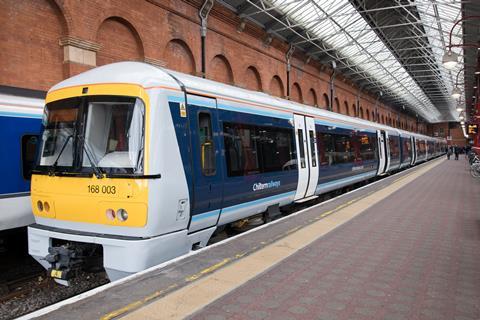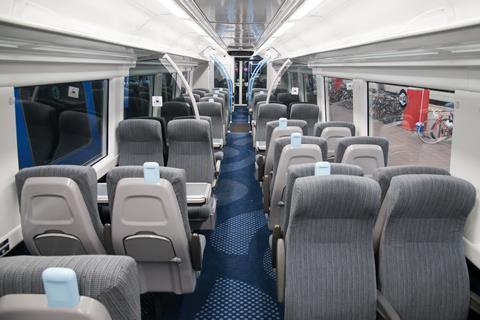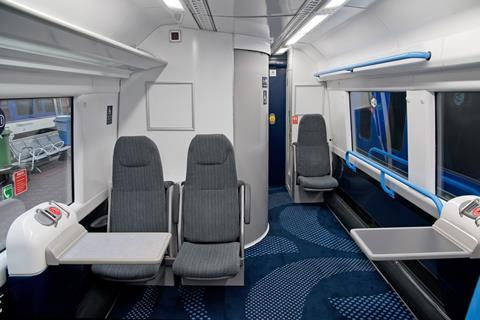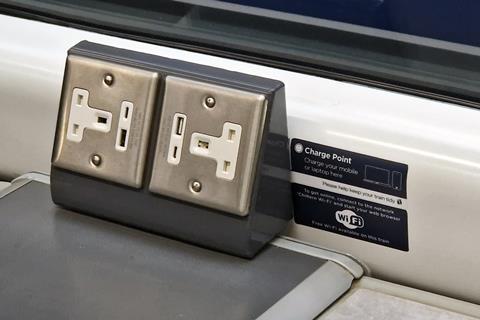
UK: Chiltern Railways has unveiled the first of its 28 Class 168 diesel multiple-units to be refurbished under a £12m programme.
However, the programme is facing delays because of the greater than anticipated differences in the first post-privatisation trainsets.
Speaking to stakeholders at the presentation of the refurbished DMU at London Marylebone station on October 9, Managing Director Richard Allan said the work represented the biggest investment in Chiltern Railways this decade, adding ’I am really impressed with what we have achieved within the budget, it’s a terrific job’.
Refurbishment programme

The work carried out by Arriva Traincare in Crewe includes heavy maintenance with battery and air system overhauls, external repainting, interior upgrades, new wi-fi, installing USB charging sockets, reliability improvements, overhaul of the heating and cooling system, and new carpets and lighting.
In the often contentious area of the seats, where those in the Class 168s are well-liked, the original frames have been retained and repainted with new foam and covers fitted.
The vehicles are being stripped back to their bodyshells and a significant level of corrosion, some of which is thought to have been present for 15 or 20 years, removed. Around 80% of the assemblies and components are being either replaced or overhauled.
Elements of the C4, C6 and C10 periodic maintenance programme are being carried out, with Arriva Traincare Director Russell Fletcher telling Rail Business UK that ’apart from the bogies, this train shouldn’t need to stop for planned heavy maintenance for a good number of years’.
Five prototype units

While the original plan was for the programme to be completed in 15 months, work on the first DMU has taken considerably longer.
The initial five Class 168/0 sets were the first trains to be procured in the privatisation era, being ordered in 1996 after a period of 1 064 days when no new orders were placed.
They were built by Adtranz in 1998. Eight Class 168/1 and six Class 168/2 sets in a mix of three and four-car variants were acquired over the following six years to 2004, and then in 2015-16 nine two-car Class 170 sets were transferred from TransPennine Express to join the Chiltern fleet as Class 168/3.
Fletcher explained that trains 168 001-005 were ‘very bespoke’, having been built as the design which developed into the successful Class 170 was still being finalised.
‘They have a lot of differences, which were almost prototype build issues and which were corrected for the production run’, he said. Many panels were found to be unique, and had to be replaced in exactly the same locations during the refurbishment.
’Despite having carried out work on Class 170 units we found things which we had not seen before in the production run models. It is very true to describe the 168/0 sets as five separate prototypes, and we have already found a number of differences between 168 003 and the second set being refurbished, 168 001.’
Fletcher added that ‘it would have been incredibly naive of us to say we didn’t expect to find anything, but the extent of what has been found was perhaps a bit more than we anticipated. However, it has helped us refine the production process for the remainder of the fleet,
‘We will be glad to have done the five so that we can get on with the rest of the fleet.’
With Arriva Traincare now working on two DMUs at a time, the aim is for each train to take 10 weeks to be completed.

The extent of the work was acknowledged by Ben Ackroyd, COO of leasing company Porterbrook, who said passenger expectations have continued to develop and it is important that trains are upgraded to match.
‘This DMU has travelled the equivalent of the mileage to the moon and back over eight times since its introduction, so it was about time for a mid-life refurbishment and modernisation programme. There are many years of life left in this train, but it’s a really important point for it to receive this investment.’
Porterbrook owns 25 of the Class 168s, and the three Eversholt-owned trainsets will also be refurbished, albeit with some differences mechanically because of their maintenance regime.
Class 165 refresh
The programme for the 168s will be followed by a £4m refresh of the 39 Class 165 DMUs, which are now more than 34 years old.
Arriva Traincare will be undertaking the work at its Bristol Barton Hill facility from February.
Given the age of the sets and the expectation that they will be replaced rather more quickly than the Class 168s, the scope will be less extensive, but it will include new seat covers and flooring as well as installation of LED lighting and upgrading of the toilets.
Repainting is not included, and it will not be possible to add at-seat charging points as this would require more costly work to the electrical system and replacement of the existing alternators.



